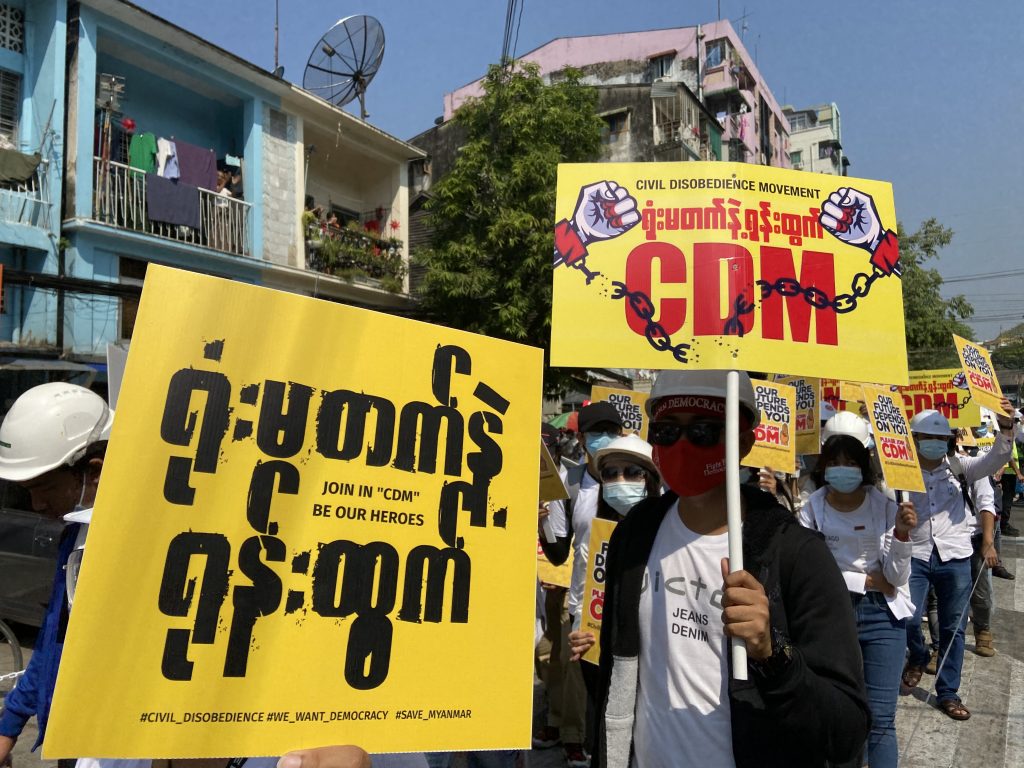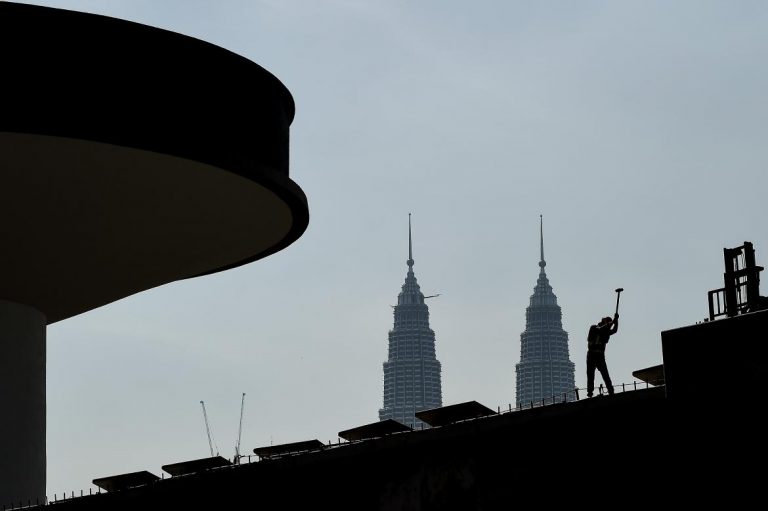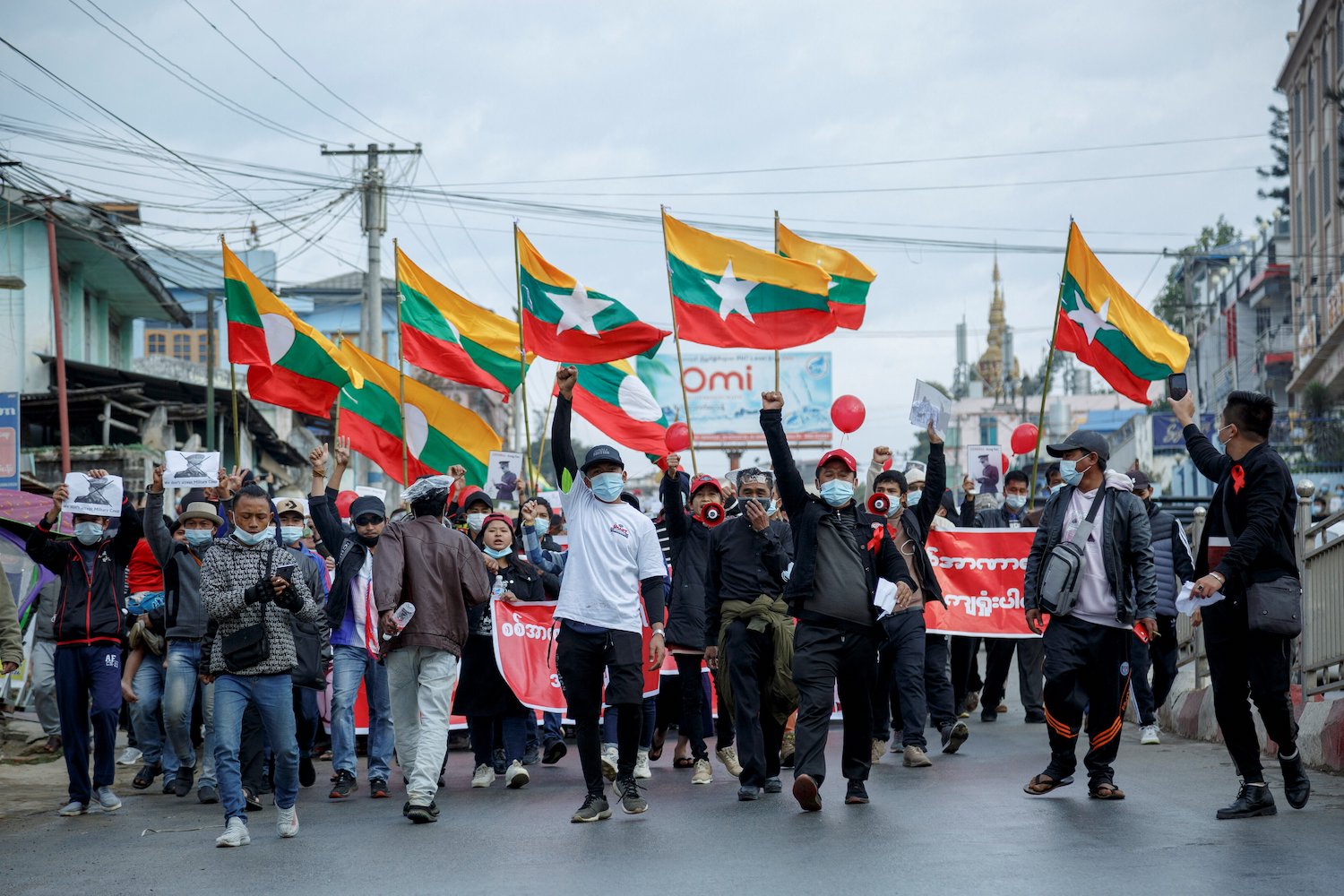Despite the junta’s threats of reprisals, the Civil Disobedience Movement keeps growing by the day and its members are set on a near-total shutdown of government.
By FRONTIER
Since the Myanmar military seized power from the elected government on 1 February, hundreds of thousands of people – perhaps millions – have taken to the streets under the banner of the Civil Disobedience Movement. Although the CDM has come to encompass street protests and public boycotts of military-owned products, at its core is a strike by tens of thousands of public servants, which began among medics two days after the coup.
Across the country, doctors, nurses, teachers, railway workers and staff from a range of government ministries and enterprises have been refusing to go to work, in order to make it impossible for the new junta to govern. They have been joined by private sector employees in sectors such as banking and transport that are considered crucial to the regime’s survival.
But although the campaign has widespread public support, some of those taking part are worried about how long it can last in an economy already decimated by the COVID-19 pandemic and amid increased threats and harassment from authorities.
“The coup is unacceptable and we have to resist it,” said a lecturer at East Yangon University, who, like most of those interviewed for this article, spoke to Frontier on condition of anonymity because of concerns for their safety. The lecturer, who has worked at the university in Thanlyin Township for the last 10 years, joined the movement when it began on February 3 and has still not returned to work.
Up-country in Mandalay, an assistant physician at the city’s Children’s Hospital involved in the movement said he was aware of the risks, particularly that he could lose his medical license or face criminal charges, but that he was determined to continue.
“I don’t care if I face action for my decision; I’m ready to face the worst,” the physician said. “The goal is to fight for the return of an elected government. We will continue with CDM until that happens.”
Those messages of determination were common among the CDM participants Frontier spoke to, with most aware they could face arrest or dismissal at any moment.
“Even if the [military government] does not fall, I will not return to work,” said an assistant physician from Insein Township Hospital in Yangon’s northern outskirts.
The movement has been inspired in-part by actions from abroad, participants say. The East Yangon University lecturer said similar campaigns had been launched in dozens of countries, most notably in Tunisia, referring to the 28-day civil resistance campaign in 2010 and 2011 that led to the ousting of long-term president Zine El Abidine Ben Ali.
The lecturer said she believed CDM would work if more than two thirds of government staff took part.
“We don’t know the exact percentage [of public servants taking part], but so far the health, transport and banking sectors have collapsed,” she said, adding that she planned to stay involved in the movement for at least two months.
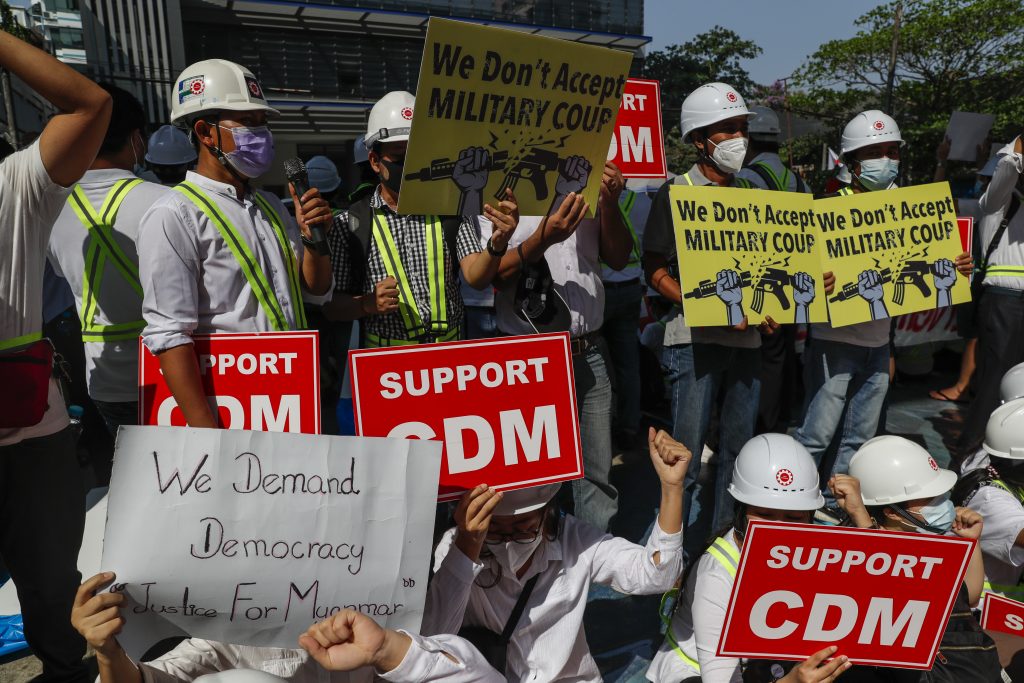
Fighting in the dark
The number of staff joining the CDM varies sharply across the government’s more than 40 ministries, and the movement’s underground and leaderless nature make gauging the overall number of participants difficult. So too do the varied ways in which public servants have taken part – some by loudly taking to streets in their work uniforms, others by quietly staying at home, and still others by turning up to work but refusing to follow orders.
While some striking staff have been pressured by their employers to resume work, those who remain at their desks are facing pressure from the public. CDM supporters have formed picket lines in front of government buildings in order to encourage staff to join, or have taken photos of civil servants going to work and shamed them on social media.
These tactics have contributed to the movement’s rapid growth. There have been high-profile defections to the CDM, including vice permanent secretary of the Attorney General’s Office U Thant Sin, who wrote on Facebook on February 28 that he was “donating” his rank to the revolution, and a number of diplomats at embassies abroad and at the United Nations. However, the movement’s success ultimately depends on the tens of thousands of low-ranking public servants who in normal times keep the state functioning.
A deputy director general at the Ministry of Electricity and Energy told Frontier that between 50 percent and 90pc of all staff across the ministry’s 11 departments have joined the CDM. “Given that we work as a team, the difficulties of managing the operation are obvious,” he said. “If [many] in the department don’t work, the rest can do nothing even if they turn up.”
This may have contributed to a nationwide power cut across Myanmar’s national grid on March 5. The Department of Power Transmission and System Control said it was because of a fault on the 230-Hlawga-Thaketa power line in Yangon Region, which had been preceded by several Yangon power generators “tripping”, but it’s feasible that the large number of absent electrical power staff added to these technical problems. More unplanned outages are likely in the coming hot-season months, when demand for power peaks.
“I don’t pressure them,” the deputy director general said of striking members of his staff. “Instead, I try to explain the difficulties that the people would face if we all joined the CDM. The country would go dark because we wouldn’t be able to provide power.”
But he admitted that these attempts at persuasion had often failed. “Some reply that they are prepared to fight in the dark against the coup. I have nothing more to say to this. Ultimately, it’s their choice.”
The director general added that many of them were motivated more by social shaming than conviction. “Non-CDM staff have had their personal information spread on social media,” he said of a doxing trend that has made strike-busters targets of public scorn.
He also said there were staff who “are coming to work but doing nothing, saying they are participating in the CDM [from their desks]”, and that this had made his position more awkward. “I have such a difficult time working in the middle,” he said.
The regime seemed to acknowledge the extent of the movement when, on March 5, state broadcaster MRTV reported in its evening news bulletin that 30pc of government staff had been induced to join the CDM by “unscrupulous people”. The report also claimed that an unspecified number had returned to work in the last week of February because they needed to receive their salaries.
There appears to be some truth to this latter claim. While the movement overall appears to be gaining momentum, some CDM participants interviewed by Frontier described an ebb and flow. They said that several of their striking colleagues had returned to work because of pressure from their seniors and a fear of losing their livelihood, as well as doubts about the movement’s ultimate success.
A Ministry of Social Welfare, Relief and Resettlement staffer who joined the CDM on February 8 said that about 150 of the 500 staff at the ministry’s Nay Pyi Taw head office have joined – a decline from earlier numbers, even though the movement was growing in other parts of the ministry.
“At first our office had more than 200 staff join CDM, from junior to director level. Some staff quit from the [civil disobedience] movement because of pressure from above, while others were induced by promotion,” he said, adding that exams for promotion within the ministry took place as planned on February 16, despite objections.
The social welfare ministry staffer said that some of those who had returned were “sceptical [of success] and do not have the courage to make decisions”.
To evade public scorn, he said, non-striking government staff had tried to sneak into work without being seen. Some had travelled by shuttle buses with the name of their respective departments removed, while others had gone to the office in plain clothes, then changed into their uniforms at the office, he said.
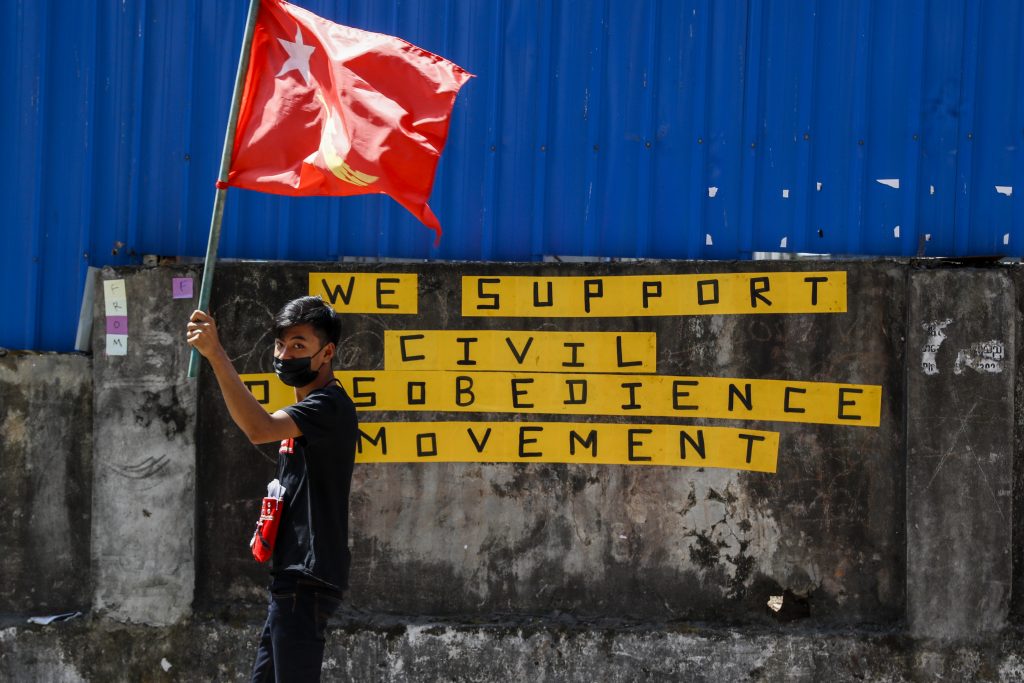
Returning to work ‘with a smile’
The junta, which calls itself the State Administration Council, has warned those in the CDM that failure to return to work in time could result in “action” being taken against them. Although the punishment in unspecified, many in the movement fear it could extend to summary dismissal, arrest, or their family being targeted.
These fears were heightened when, on February 12, a group of unidentified men in plain clothes raided the housing of Ministry of Information staff who had joined the CDM and destroyed property while apparently searching for something. Radio Free Asia shared video of one ransacked apartment taken by the husband of a striking MoI staffer who was in hiding at the time of the raid. The husband claimed he was beaten by the men.
At the SAC’s first press conference on February 16, Deputy Minister for Information Brigadier General Zaw Min Tun said the government was waiting for its staff to return to work “soon”, adding that it would not take action against those who came back “in time” but would against those who did not. Although Zaw Min Tun didn’t provide a deadline, he said it “won’t be long” and that civil servants should “go to the office with a smile”.
Zaw Min Tun also insisted that the CDM would have no serious consequences for the government.
“The whole government mechanism is still working and we have enough capacity to replace [those joining the CDM],” he said, claiming that senior officials have been able to successfully persuade some striking staff to return to work. He accused doctors and teachers of breaking their professional oaths by going on strike.
Since the press conference, state media have published a series of warnings citing the civil service code of conduct, and a letter seen by Frontier that was circulated among staff of the parliamentary complex in Nay Pyi Taw laid out a series of deadlines and associated penalties, which included demotion and dismissal.
However, these deadlines have all passed, reportedly without the threatened repercussions. This suggests that, contrary to Zaw Min Tun’s show of indifference, the junta realises it would be unable to replace staff if they were fired or jailed, and that it is still banking on them returning to work eventually.
Instead of striking government workers, the regime has largely focused on prosecuting high-profile advocates of the CDM, and those who are coordinating fundraising for the movement and openly enticing others to join. They include nine Ministry of Foreign Affairs staff, along with one each from the ministries of Planning, Finance and Industry and of Transport and Communication, who were jointly arrested in Nay Pyi Taw on February 18. They have been charged with criminal incitement and face several years in prison for allegedly using social media to encourage other civil servants to join the CDM.
Yet, despite the junta’s selective approach to punishing CDM participants, some told Frontier they were not taking any chances.
“We dare not stay in the staff quarters, and have to sleep every night in a small village. I never thought I would be running [away] as a civil servant,” said the senior staff member from the social welfare ministry.
Public servants in the CDM have also rejected the accusations made by the military regime that they are violating their code of conduct.
“They are talking about the need for civil servants to be free from party politics. What I am doing now is not party politics. We are conducting national politics for the [good of the] country,” said a government schoolteacher, who did not want to provide their name.
The assistant physician at Insein Hospital agreed, saying they were not acting unethically but instead working for the long-term benefit of the people, while a lecturer from Dagon University elsewhere in Yangon said they were saving the future of their students.
“If we support this system [of military rule], our children will have a life like ours,” the lecturer said, recalling her young years spent under Myanmar’s previous military regime. “I am more afraid of losing my children than losing my job.”
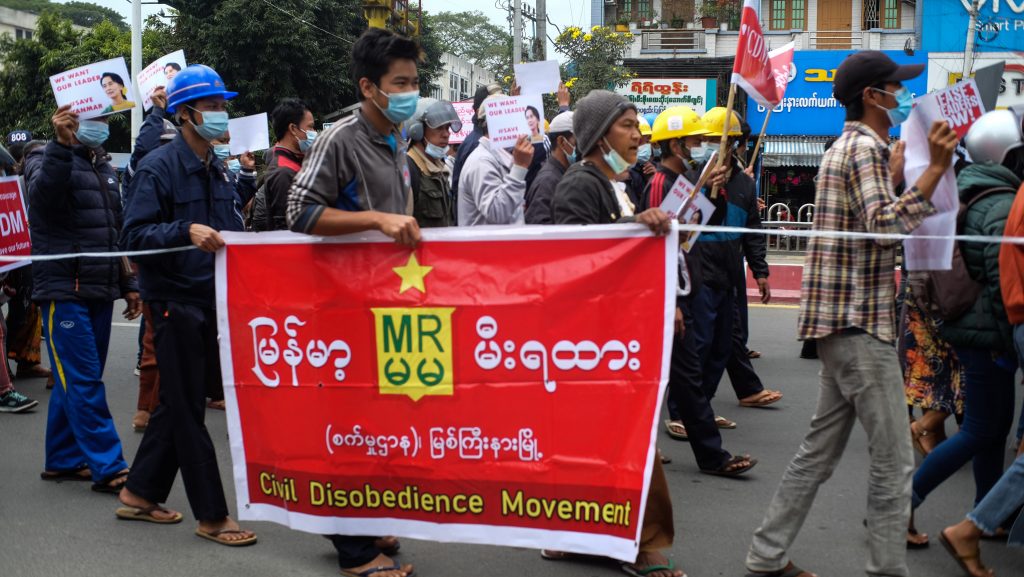
Nothing to lose
With many workers in the CDM likely to miss out on their salaries in the coming months, volunteer groups have proliferated to offer support. A member of one of these groups said their organisation had helped about 4,000 railway staff who had joined.
“Sometimes we provide basic commodities including rice, and sometimes can provide cash donations of between K15,000 and K20,000. The amount depends on the donations [we get],” the volunteer said.
The group has faced many obstacles, she said, mostly linked to the need to operate in secret because the junta has threatened to prosecute those supporting the CDM.
“If we share contact numbers in public, we could be arrested through [authorities] tracking these numbers,” she said, adding that some of the phone numbers they had previously shared online had later been blocked.
“If we receive a phone call, we feel unsafe. We note their information and assign someone to corroborate it before we can transfer the cash or commodities to someone in need,” she said. “Because of these problems the process is long and we often cannot provide assistance in time. We feel bad about that.”
U Khine Win, executive director of think-tank the Sandhi Governance Institute, believes the campaign has a high chance of success but only in conjunction with other actions, including a public boycott of military-run businesses and international pressure on the generals.
He said said that the workers with the most leverage over the military government were banking employees, transport staff and teachers. However, because some ministries were inefficient and overstaffed to begin with, it’s questionable how much of an impact the movement will have on their ability to function, he said.
“[These ministries] do not work effectively, so there will be no significant decline in operations,” he said, adding that the more people that joined from ministries that deal with the economy, the better the likelihood of victory.
Khine Win added that, despite the widespread sacrifices required by the CDM, public support for the movement remained high, partly because of the unemployment and destitution caused by the COVID-19 pandemic.
“Many of them seem to have no hope in their minds,” he said. “When the military coup happened, they did not think hard before opposing it because they have so little to lose.”


